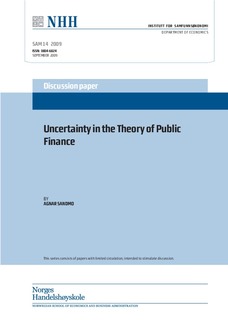| dc.contributor.author | Sandmo, Agnar | |
| dc.date.accessioned | 2009-12-02T12:12:57Z | |
| dc.date.available | 2009-12-02T12:12:57Z | |
| dc.date.issued | 2009-09 | |
| dc.identifier.issn | 0804-6824 | |
| dc.identifier.uri | http://hdl.handle.net/11250/163322 | |
| dc.description.abstract | This paper discusses the role that the economics of uncertainty has played in the theory of
public finance. From being mostly concerned with its choice-theoretic foundations in the
1950s and ‘60s, the theory of expected utility maximization and risk averse behaviour has
contributed decisively to the development of several areas of the theory of public finance.
Three of these have been chosen here to illustrate the general point: Taxation and risk taking,
the role of uncertainty in public expenditure and the theory of tax evasion and compliance. | en |
| dc.language.iso | eng | en |
| dc.publisher | Norwegian School of Economics and Business Administration. Department of Economics | en |
| dc.relation.ispartofseries | Discussion paper | en |
| dc.relation.ispartofseries | 2009:14 | en |
| dc.title | Uncertainty in the theory of public finance | en |
| dc.type | Working paper | en |
| dc.subject.nsi | VDP::Samfunnsvitenskap: 200::Økonomi: 210::Samfunnsøkonomi: 212 | en |
